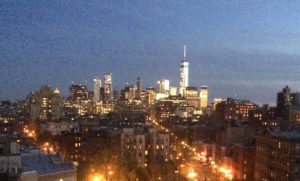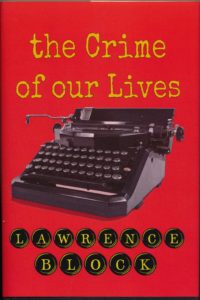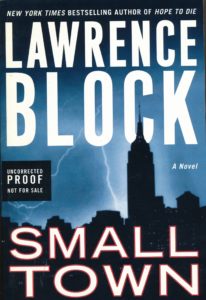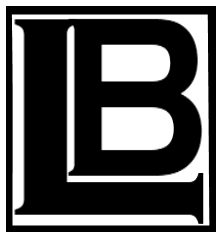Mystery Readers Journal turned its attention to New York mysteries in its Spring 2016 issue, and Janet Rudolph invited me to contribute an essay. Here it is; click to get the entire issue, or even better to subscribe.
All Around the Town
by Lawrence Block
 In July of 1985, my Frequent Companion and I moved to a big old house in Fort Myers Beach, Florida. I went to work right away on the book version of my seminar, “Write For Your Life,” wrote a couple of short stories and a couple of my monthly columns for Writer’s Digest, even as we both settled into a life that was very different from the one we’d been living in New York’s Greenwich Village.
In July of 1985, my Frequent Companion and I moved to a big old house in Fort Myers Beach, Florida. I went to work right away on the book version of my seminar, “Write For Your Life,” wrote a couple of short stories and a couple of my monthly columns for Writer’s Digest, even as we both settled into a life that was very different from the one we’d been living in New York’s Greenwich Village.
And I found myself wondering what sort of fiction I’d produce in this new venue. Where would I set it?
Except for two years in the mid-1960s in Buffalo, and two more in Racine, Wisconsin, I’d spent all my writing life in or near New York City—and that’s where I’d set most of my work. My several series characters were all New Yorkers, by birth or adoption. Evan Tanner’s adventures took him all over the world, but when he wasn’t sneaking across borders and fomenting revolutions, he lived in a walk-up apartment on West 105th Street, just a ten-minute walk from Columbia University, for whose less industrious students he ghosted term papers and theses. Chip Harrison worked in Leo Haig’s Chelsea backhouse, and slept in a furnished room not far away. Bernie Rhodenbarr, an Ohioan by birth, was another denizen of the Upper West Side, residing on West End Avenue and 70th Street; his neighbor, Mrs. Hesch, whose door he’d obligingly open whenever she misplaced her keys, thought highly of him because he lived an irreproachable life on the West Side while stealing from those momzers on the East Side.
And Matthew Scudder, of course, had a hotel room at the Northwestern, on 57th Street at Ninth Avenue. (This was many books before he and Elaine moved into the Parc Vendôme, just across the street.)
But I wasn’t living in New York anymore. When I walked out my back door in the morning I was on a sandy beach with the Gulf of Mexico in front of me. If this was home from now on, wouldn’t it be natural for me to set my future fiction here? Florida, to be sure, had inspired the crime fiction of no end of writers, and many of them, like me, were Floridians by adoption. Surely the genre had room in it for another Florida writer.
I reflected on all of this, and a thought intruded. It won’t work, a voice assured me. Because you lack an intuitive understanding of who the people are down here, or what their lives are like. You can live here in Paradise, that’ll be okay, but you’d probably be best advised to go on setting your stories in New York.
That probably should have told me something, and maybe it did, although the message took a while to sink in. And I might have gotten it earlier—the first week in our new home, say. The very first morning I woke up, went outside to the beach, turned left, and took a glorious leisurely walk on the sand for perhaps half an hour, then turned around and came home. The following morning I turned right instead of left, had another splendid walk on the beach for about as long, then came back.
The third morning I went outside, looked to the left, looked to the right, and realized there was no place to go.
Nothing against Florida, but it never really worked for us, and after two years we closed the house and tried life without a fixed address. We saw a lot of the country, stayed in no end of budget motels, gave our hegira the illusion of purpose by seeking out towns named Buffalo—and were always on the lookout for our next home.
Which of course turned out to be New York. We moved back on St. Patrick’s Day, 1990, and have been here ever since.
I wasn’t born here. I grew up upstate, in Buffalo. (And set a couple of books there—Sheldon Lord’s first work of midcentury erotica, Carla, and a piece of serious mainstream fiction, Jill Emerson’s A Week as Andrea Benstock. And more recently, Buffalo has been the home of Martin H. Ehrengraf, the criminous criminal lawyer whose tales are collected in Defender of the Innocent.)
My dad was originally from New York, and when I was ten years old the two of us took the train to Grand Central, put up at the Hotel Commodore, and spent a magical weekend that included a Broadway show (“Where’s Charlie?”), a TV broadcast (“The Ed Sullivan Show”), a ride on the Third Avenue El all the way down to the Bowery, a visit to the Statue of Liberty and the top of the Empire State Building.
I probably became a New Yorker that weekend. Seven or eight years later I was living here as an Antioch student on a co-op job in the mailroom at Pines Publications, living at 54 Barrow Street in the Village. One Sunday morning I wrote a story about a young man living by his wits, working short cons and mail fraud; a year or so later it became my first sale when Manhunt bought it and published it as “You Can’t Lose.”
 By then I was back in New York, working for Scott Meredith. (I’ve written at length about those days, for Mystery Scene, the columns since collected in The Crime of Our Lives.) I spent my days reading amateur efforts and my evenings writing stories of my own. Then I went back to college, and when the school concluded I’d be happier somewhere else, I went back to Buffalo for a while and then moved once again to New York.
By then I was back in New York, working for Scott Meredith. (I’ve written at length about those days, for Mystery Scene, the columns since collected in The Crime of Our Lives.) I spent my days reading amateur efforts and my evenings writing stories of my own. Then I went back to college, and when the school concluded I’d be happier somewhere else, I went back to Buffalo for a while and then moved once again to New York.
There was some to-ing and fro-ing, more than you need to keep track of, but New York City was always my home, whether or not I happened to be living there. I think that’s been true from the beginning, from that first visit with my dad in 1948.
People have occasionally noted the New Yorkiness of my work, and it’s frequently observed that the city is a virtual character in the books. That may be a stretch, but it’s certainly a significant presence.
For many years, I had it in mind to write a big New York novel, a sprawling multiple-viewpoint confection that would encompass as much of the city as I could get into it. I even had a title, Small Town, that came from a line of John Gunther’s. But a title and an epigraph, while promising, does not mean that the ensuing book will write itself—and for years on end, that was as far as it went.
Then in the late spring or early summer of 2001, I got enough of a handle on the book to start writing it, and it went pretty well. Characters and situations came to life, and I must have had, oh, perhaps 25,000 words written. And then some clowns flew a couple of planes into the World Trade Center, and the world turned upside-down.
 I couldn’t think about writing anything for months, and when I did reflect on Small Town, I figured it was dead in the water. The city had changed—hell, the world had changed, but nowhere more utterly than here. It was pre-9/11 in my book, and post-9/11 outside my window, and my big New York novel looked to be stillborn.
I couldn’t think about writing anything for months, and when I did reflect on Small Town, I figured it was dead in the water. The city had changed—hell, the world had changed, but nowhere more utterly than here. It was pre-9/11 in my book, and post-9/11 outside my window, and my big New York novel looked to be stillborn.
And then a little more time passed, and I looked at what I had written, and figured out what to do. I was able to use much of what I’d written, and folded it into a story set in the ashes of 9/11. It’s not mine to say if it works or not. It was well received, by and large, and some readers cite it as a favorite book of mine, but I never got negative reader mail like I did with Small Town, all because of the book’s sexual content. It was longtime readers who were most apt to be outraged; here they were hoping for another cheery mystery with a congenial burglar and his tailless cat, and what they got was art dealer Susan Pomerance…
Never mind. I love this city, and I guess it shows. Now and then I hear from a reader who’s taken a self-directed Scudder tour of the city. Before Jimmy died and the joint closed, they used to show up at Armstrong’s saloon to get their pictures taken with the man himself. They can find the Parc Vendôme readily enough, and sometimes they stay at the gussied up Hudson Hotel, which has replaced the fictional Northwestern. They can light candles at St. Paul the Apostle and grab a bite at the Morning Star or the Flame. But they’ll look in vain for Elaine’s antique shop, or Paris Green, or Grogan’s Open House, where Mick Ballou and Matt would talk the hours away…

I don’t know how I missed this one. Must have been sleeping. Just ordered it on my trusty Kindle.
Think you’ll enjoy it, Joe.
LB is my ideal epitome of a great writer of great stories that I sooooo enjoy — even his newsletters are fun to read!
Awww. Thanks, Marianne.
LB is responsible for my sleep deprivation. When I am reading something by him I am unable to put it down! As I tell my doctor – sleep is highly overrated LB is not.
Levin, you’re too kind. Thank you!
A movie based on the life of one of the Great American Novelists? Yes please!!!!!!
Personally, I’d rather watch water evaporate.
LOL ????????
Small Town was my first Lawrence book & I was hooked. No, it wasn’t always the pretty side of town, but people aren’t always pretty. It was the style of writing that caught me up, and that has never changed.
Thank you, Heather. Those are sweet words.
I think you’ve managed Keller’s move to New Orleans really well. I love both places, perhaps it’s the vivid street life of the West Side and the Big Easy that make them work for you?
Could be, Lucie. NOLA is my Frequent Companion’s home town, and one I’ve always loved, so that makes it easy.
As someone who lives just about as far away from Manhattan as is possible (in Australia), LB never fails to provide a fix. I quite happily get lost in New York whenever I read LB. can’t wait to start Small Town…
Lovely to hear, Simon. Hope you enjoy it!